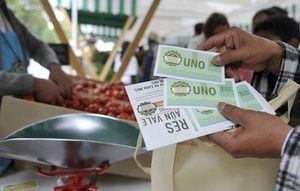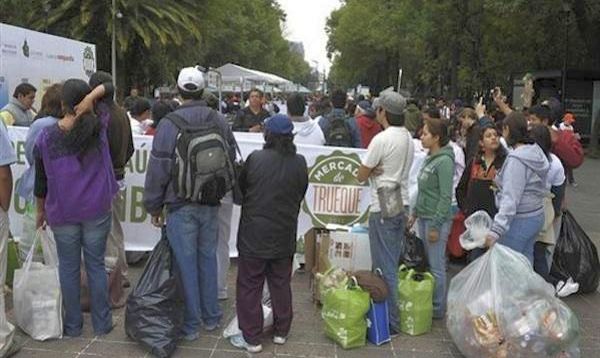Mexico City – Glass and PET plastic bottles, cardboard, paper, Tetra Pak containers, and discarded electronic devices. This might seem like a list of garbage but in Mexico City, it is currency for bartering.
The second Sunday of every month, these goods, which otherwise would be thrown away, are collected at the Mercado de Trueque (Barter Market,) run by the Environment Secretariat, or SEDEMA, at the Bosque de Chapultepec.
According to SEDEMA, the aim is to teach the importance of recycling to the population of Mexico City, which generates an average of 14,000 metric tons of garbage every day, with only 12 percent of the trash being recycled.
SEDEMA estimates that 63,000 metric tons of PET bottles – plastic bottles made of polyethylene terephthalate – are consumed each year, only 10 percent of which are recycled. Of the nearly 117,000 metric tons of paper discarded each year, only 15 percent is recycled.
"We want to show the public that what we refer to as garbage has value when it’s sorted," said Lucía Yolanda Alonso Olvera, SEDEMA’s director of environmental education. In Mexico City, the government-funded garbage service only collects trash on main roads.
The Mercado de Trueque welcomes an average of 2,500 visitors and collects an average of 14 metric tons of recyclables each time it holds the voucher program. In its first year the program received a total of 198 metric tons of recyclables and 24,352 visitors.
"It’s the second time that I’m coming and I think the market is beautiful," said María Cristina Monroy, a 62-year-old retiree who brought a few bags of clean, flattened Tetra Pak containers and glass bottles. "We’re bringing two months of stuff because we didn’t come last month. The first time, we exchanged household waste for vegetables, plants, and candy and now we want to see what we can get."
Once the market opens, recyclables are sorted by the SEDEMA staff on 10 tables. The accepted recyclables are sorted and weighed on a scale, then a receipt is issued with an equivalent amount of "green points," which can be exchanged for vouchers.
 |
The vouchers, which come in denominations of one, five, 10, and 20 points, can be used at several stands at the entrance to the market. Each kilo (2.2 pounds) of PET bottles is worth 30 green points; a kilo of paper and cardboard containers is 13 green points; a kilo of aluminum cans is 16 points; a kilo of Tetra Pak containers is 15; and a kilo of glass is three points.
The market offers users natural products and some organic items produced in Xochimilco, Tláhuac, and Milpa Alta, three agricultural boroughs in the southern region of Mexico City. There are medicinal and ornamental plants, fruits, vegetables, and legumes.
"We’ve been coming here since the market began," said Álvaro Hernández, a 33-year-old architect who exchanged about 20 kilos of soda bottles, glass, cardboard, paper, and Tetra Pak containers for 160 points. "Everything we bring has been rinsed and is clean. We like it because you can buy a lot with the points and the products are very high quality."
He exchanged the vouchers for organic cheese, vegetables, coffee, and an ornamental plant. "Whatever you get is good because nobody expects anything in return for garbage," he said. The most commonly exchanged items at the market are PET bottles, as customers are urged to bring between one and 10 kilos to exchange.
The recyclables are deposited on trucks run by two Mexican companies, which provide a list of the materials and pay SEDEMA directly. Three days later, SEDEMA pays the farmers at the market for the vouchers they’ve collected.
SEDEMA receives an average of $3,000 US for the collected material and the remaining $8,000 US needed to pay the farmers comes directly from SEDEMA.
"By sorting our waste, we can achieve a 40 percent decrease in the amount of garbage generated by each household," Alonso Olvera said. "Nearly all of the waste generated by a family is recyclable."


